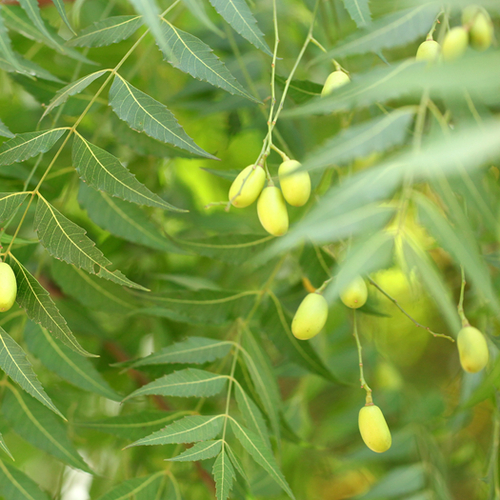
Background
Neem contains chemicals that might help reduce blood sugar levels, heal ulcers in the digestive tract, prevent pregnancy, kill bacteria, and prevent plaque from forming in the mouth.
People use neem for lice, tooth plaque, gingivitis, psoriasis, to repel insects, and for many other purposes, but there is no good scientific evidence to support most of these uses. There is also no good evidence to support using neem for COVID-19. Neem seed oil is used as a pesticide.
Safety Safety definitions
When applied to the skin: Neem oil or cream is possibly safe when applied to the skin for up to 2 weeks.
When applied inside the mouth: Neem leaf extract gel is possibly safe when applied inside the mouth for up to 6 weeks.
Special Precautions & Warnings:
Pregnancy: Neem oil and neem bark are likely unsafe when taken by mouth during pregnancy. They can cause a miscarriage.Breast-feeding: There isn't enough reliable information to know if neem is safe to use when breast-feeding. Stay on the safe side and avoid use.
Children: Neem extract shampoo is possibly safe in children when applied once or twice to the head for 10 minutes, then rinsed with warm water. Taking neem seeds and seed oil by mouth is likely unsafe in children. Serious side effects in infants and small children can happen within hours after taking neem oil. These serious side effects include vomiting, diarrhea, drowsiness, seizures, loss of consciousness, coma, and death.
"Auto-immune diseases" such as multiple sclerosis (MS), lupus (systemic lupus erythematosus, SLE), rheumatoid arthritis (RA), or other conditions: Neem might cause the immune system to become more active. This could increase the symptoms of auto-immune diseases. If you have one of these conditions, it's best to avoid using neem.
Reduced ability to have children (infertility): There is some evidence that neem can harm sperm. It might also reduce fertility in other ways. If you are trying to have children, avoid using neem.
Organ transplant: There is a concern that neem might decrease the effect of medications that are used to prevent organ rejection. Do not use neem if you have had an organ transplant.
Surgery: Neem might lower blood sugar levels. There is a concern that it might interfere with blood sugar control during and after surgery. Stop using neem at least 2 weeks before a scheduled surgery.
Effectiveness
- Tooth plaque. Applying a gel containing neem leaf extract to the teeth or using a neem mouthwash can reduce the amount of plaque on the teeth. But it is not clear if neem is as helpful as using chlorhexidine mouthwash or gel.
- A mild form of gum disease (gingivitis). Applying a gel containing neem leaf extract to the teeth or using a neem mouthwash can reduce gingivitis in some people. But it is not clear if neem is as helpful as using chlorhexidine mouthwash or gel.
- Lice. Applying a neem extract shampoo to the scalp once can treat head lice in children.
Dosing & administration
Interactions with pharmaceuticals
Medications changed by the liver (Cytochrome P450 2C8 (CYP2C8) substrates)
Interaction Rating=Moderate Be cautious with this combination.
Some medications are changed and broken down by the liver. Neem leaf might change how quickly the liver breaks down these medications. This could change the effects and side effects of these medications.
Medications changed by the liver (Cytochrome P450 2C9 (CYP2C9) substrates)
Interaction Rating=Moderate Be cautious with this combination.
Some medications are changed and broken down by the liver. Neem leaf might change how quickly the liver breaks down these medications. This could change the effects and side effects of these medications.
Medications changed by the liver (Cytochrome P450 3A4 (CYP3A4) substrates)
Interaction Rating=Moderate Be cautious with this combination.
Some medications are changed and broken down by the liver. Neem leaf might change how quickly the liver breaks down these medications. This could change the effects and side effects of these medications.
Medications for diabetes (Antidiabetes drugs)
Interaction Rating=Moderate Be cautious with this combination.
Neem might lower blood sugar levels. Taking neem along with diabetes medications might cause blood sugar to drop too low. Monitor your blood sugar closely.
Medications moved by pumps in cells (P-glycoprotein substrates)
Interaction Rating=Moderate Be cautious with this combination.
Some medications are moved in and out of cells by pumps. Neem leaf might change how these pumps work and change how much medication stays in the body. In some cases, this might change the effects and side effects of a medication.
Medications that decrease the immune system (Immunosuppressants)
Interaction Rating=Moderate Be cautious with this combination.
Neem can increase the activity of the immune system. Some medications, such as those used after a transplant, decrease the activity of the immune system. Taking neem along with these medications might decrease the effects of these medications.




